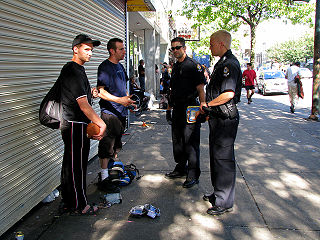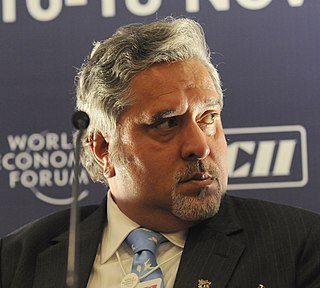
Money laundering is the process of illegally concealing the origin of money, obtained from illicit activities such as drug trafficking, corruption, embezzlement or gambling, by converting it into a legitimate source. It is a crime in many jurisdictions with varying definitions. It is usually a key operation of organized crime.

In law, fraud is intentional deception to secure unfair or unlawful gain, or to deprive a victim of a legal right. Fraud can violate civil law or criminal law, or it may cause no loss of money, property, or legal right but still be an element of another civil or criminal wrong. The purpose of fraud may be monetary gain or other benefits, for example by obtaining a passport, travel document, or driver's license, or mortgage fraud, where the perpetrator may attempt to qualify for a mortgage by way of false statements.

Capital punishment in India is a legal penalty for some crimes under the country's main substantive penal legislation, the Indian Penal Code, as well as other laws. Executions are carried out by hanging as the primary method of execution as given under Section 354(5) of the Criminal Code of Procedure, 1973 is "Hanging by the neck until dead", and is awarded only in the 'rarest of cases'.

The Proceeds of Crime Act 2002 (c.29) (POCA) is an Act of the Parliament of the United Kingdom which provides for the confiscation or civil recovery of the proceeds from crime and contains the principal money laundering legislation in the UK.

Possession of stolen goods is a crime in which an individual has bought, been given, or acquired stolen goods.
The Scheduled Castes and the Scheduled Tribes Act, 1989 was enacted by the Parliament of India to prevent atrocities and hate crimes against the scheduled castes and scheduled tribes. The Act is popularly known as the SC/ST Act, PoA, or simply the 'Atrocities Act'.
"Goonda" is a term used in the Indian subcontinent for a hired criminal. It is both a colloquial term and defined and used in laws, generally referred to as Goonda Acts.
Gambling in India varies by state; states in India are entitled to formulate their own laws for gambling activities. Some states like Goa have legalised casinos. Common gambling activities like organized betting are restricted except for selective categories including lottery and horse racing.

Unlawful Activities (Prevention) Act is an Indian law aimed at prevention of unlawful activities associations in India. Its main objective was to make powers available for dealing with activities directed against the integrity and sovereignty of India. The most recent amendment of the law, the Unlawful Activities (Prevention) Amendment Act, 2019 has made it possible for the Union Government to designate individuals as terrorists without following any formal judicial process. UAPA is also known as the "Anti-terror law".

The Prevention of Corruption Act, 1988 is an Act of the Parliament of India enacted to combat corruption in government agencies and public sector businesses in India.

The Directorate of Enforcement (ED) is a domestic law enforcement agency and economic intelligence agency responsible for enforcing economic laws and fighting economic crime in India. It is part of the Department of Revenue, Ministry of Finance, Government Of India. The Enforcement Directorate focuses on investigating and prosecuting cases related to money laundering, foreign exchange violations, and economic offenses. Its primary objective is to curb the generation and circulation of black money and to ensure compliance with the laws concerning foreign exchange and prevention of money laundering. However, targets of the enforcement directorate have claimed that the they misuse powers against activists, scholars, and political rivals.

Vijay Vittal Mallya is an Indian fugitive former businessman and politician. He is the subject of an extradition effort by the Indian Government to return him from the UK to face charges of financial crimes in India.

The Code of Criminal Procedure commonly called Criminal Procedure Code (CrPC) is the main legislation on procedure for administration of substantive criminal law in India. It was enacted in 1973 and came into force on 1 April 1974. It provides the machinery for the investigation of crime, apprehension of suspected criminals, collection of evidence, determination of guilt or innocence of the accused person and the determination of punishment of the guilty. It also deals with public nuisance, prevention of offences and maintenance of wife, child and parents.

The Maharashtra Control of Organised Crime Act, 1999 is a law enacted by the state of Maharashtra in India in 1999 to combat organised crime and terrorism. Known as 'MCOCA', the Act provides the State Government with special powers to tackle these issues, including powers of surveillance, relaxed evidentiary standards and procedural safeguards, and prescribing additional criminal penalties, including the death penalty. The law was introduced by a coalition government of the Bharatiya Janata Party and Shiv Sena.
The Indian Judicial Collegium system, where existing judges appoint judges to the nation's constitutional courts, has its genesis in, and continued basis resting on, three of its own judgments made by Supreme Court judges ,which are collectively known as the Three Judges Cases.
NSE [National Spot Exchange Limited ] case relates to a payment default at the National Spot Exchange Limited that occurred in 2013 involving Financial Technologies India Ltd, when a payment default took place after a commodities market regulator, the Forward Markets Commission (FMC), directed NSEL to stop launching contracts. This led to the closure of the Exchange in July 2013.
The INX Media case refers to an ongoing high-profile money laundering investigation in India. It involves allegation of irregularities in foreign exchange clearances given to INX Media group for receiving overseas investment in 2007. P. Chidambaram was union finance minister at the time. His son Karti Chidambaram has been implicated by the investigating agencies.
Financial Intelligence Unit – India (FIU-IND) is an organisation under the Department of Revenue, Government of India which collects financial intelligence about offences under the Prevention of Money Laundering Act, 2002. It was set up in November 2004 and reports directly to the Economic Intelligence Council (EIC) headed by the Finance Minister.
The Section 228A of the Indian Penal Code was inserted into the Indian Penal Code 1860 by the Criminal Law amendment Act 1983 by the Parliament of India to prevent social victimization or ostracism of the victim of a sexual offence. The law provides for up to two years imprisonment with or without fine for those who reveal the identity of victims of sexual abuse in public. The law has been amended subsequently to add more sections of the Indian Penal Code under its purview.
Financial regulation in India is governed by a number of regulatory bodies. Financial regulation is a form of regulation or supervision, which subjects financial institutions to certain requirements, restrictions and guidelines, aiming to maintain the stability and integrity of the financial system. This may be handled by either a government or non-government organization. Financial regulation has also influenced the structure of banking sectors by increasing the variety of financial products available. Financial regulation forms one of three legal categories which constitutes the content of financial law, the other two being market practices and case law.








